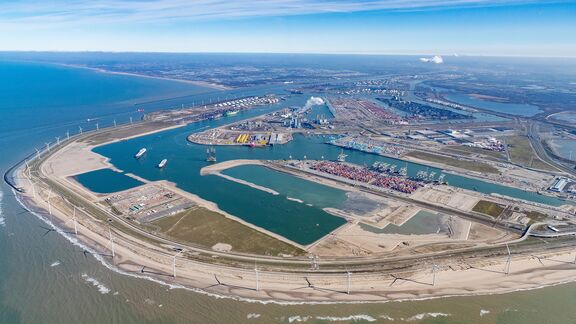Port Authority appeals to EU: position ports smartly for future-proofing Europe
Reading time: 3 minutes
The European Union faces the challenge of reconciling the transition to a sustainable economy with preserving our prosperity. Fit for 55 and REPowerEU are aimed at achieving this. The Port of Rotterdam Authority emphasises to the future European Commission and Parliament the need for stable policies and a vigorous stimulus of green energy and a circular economy.
Boudewijn Siemons, CEO of the Port of Rotterdam Authority: “Put implementation of the energy transition centre stage and use European ports intelligently to secure strategic autonomy.”
Download our position paper

“Geopolitical tensions and increased pressure on industry demand a strong stance from the European Union. The port of Rotterdam has a large industrial complex and is a major hub for containers, energy and raw materials. Here, as in many other European ports, there is a confluence of major challenges, such as making international transport more sustainable, reliable supply chains for businesses and consumers and accelerating the sustainability of industry without losing competitiveness. Consequently, ports can and want to play an important role in future-proofing Europe. It is no accident that in Rotterdam we say: when the port is doing well, the European economy is doing well,” states Siemons.
Stimulus-based industrial policy
It is clear to the Port Authority that many industrial companies in Rotterdam are keen to invest in making their production more sustainable, but have not yet made a final investment decision. For them, it is crucial that the European investment climate offers sufficient securities and prospects for the future. The European Emissions Trading System (ETS) encourages industry to become more sustainable and the Carbon Border Adjustment Mechanism (CBAM) reinforces a level playing field globally. Broad, stimulus-based European industrial policy is a necessary complement to maintaining commercial activity, especially if Europe wants to reduce its dependency on other countries and remain a leader in innovative, sustainable manufacturing.
Support for implementing the energy transition
Several Rotterdam-based public and private projects are making major contributions to ensuring industry in Northwest Europe becomes more sustainable. These include storage of CO2 under the seabed, the import and production of hydrogen, and the expansion of the circular economy. These projects are currently being implemented and the Port Authority is keen to see the European Union’s continued support. For example, the Port Authority would like to see a more distinct focus at the European level on the link between the energy transition and the raw materials transition.
To ensure that implementation of the energy transition continues apace, and is not delayed by a lack of capacity on the electricity grid, for example, the Port Authority is asking the EU to work on an approach based on acceleration areas in industrial clusters such as ports. The port also advocates accelerating the build-up of renewable energy chains in Northwest Europe. European funds can contribute to this.
Growth of sustainable transport
Freight transport is the backbone of the single market and allows companies to import raw materials, parts and semi-manufactured goods and sell their products across the continent. The port of Rotterdam is working hard to meet the growing demand for transport. Investments in infrastructure maintenance and capacity are badly needed in the coming years in this regard. Strengthening European rail and inland waterway capacity plays a major role in this, especially as climate change is having a major impact on the navigability of waterways.
The port of Rotterdam is investing heavily in making transport more sustainable over the next few years, with the hope of having a positive impact on sectors that operate internationally. That is why it is advocating for additional European incentives to make renewable fuels more competitive. The EU’s commitment to pricing shipping fuels through the International Maritime Organization (IMO) is key here for ensuring a level international playing field.